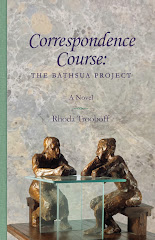My Life in Middlemarch
By Rebecca
Mead
Crown
Publishers
294 pages
9780307984760
Review published
January 28, 2014
When asked her opinion of George
Eliot’s newly published Middlemarch in
1873, Emily Dickinson famously replied, "What do I think of Glory?" Half
a century later Virginia Woolf called
Middlemarch "one of the few English novels written for grown-up people."
In 2007 A.S. Byatt called Middlemarch
“arguably the greatest English novel ever.”
In My Life in Middlemarch, New Yorker staff writer Rebecca Mead
agrees — and goes further, demonstrating how a passionate attachment to a great
book helps us understand our own lives. Although this genre-bridging study of
the novel, its author, and their lifelong impact on Mead will appeal
particularly to Eliot and Middlemarch enthusiasts
(including this reviewer), the work may well persuade other readers to join
their ranks.
For a clear,
elegant précis of My Life in Middlemarch,
read Mead’s 2011 New Yorker essay, “Middlemarch
and Me: What George
Eliot Teaches Us”. For the
in-depth meditation on the novel, the author, and the power and pleasure of
reading a great book again and again at all stages of life, read Mead’s book
cover to cover.
Like Middlemarch, the book examines the
complexities of love and marriage, of ambition and disappointment, of youthful
idealism and mature sufferance. Unlike Middlemarch,
however, it is under 300 pages (Middlemarch
is more than twice as long); also unlike Eliot’s masterpiece its stream-of-consciousness
structure allows Mead to roam freely and intuitively among the genres of memoir,
biography, literary history and analysis. When we close My Life in Middlemarch we know a bit about Mead and a great deal
about the life and work of Eliot (born Mary Ann Evans), her admirers and her intimate
circle.
Mead has taken
seriously E.M. Forster’s famous dictum, “Only connect.” My Life in Middlemarch convincingly links the novel’s panoramic
plot, fully-drawn characters, and profoundly sympathetic themes on the one hand
with events and people in the lives of Eliot and Mead herself on the other. Mead
connects Eliot’s early passionate theological inquiries and brief attraction to
the philosopher Herbert Spencer to the fictional Dorothea Brooke’s youthful idealism and disastrous first marriage
to the icy, much older scholar Edward Casaubon. Mead also acknowledges
parallels between the Eliot/Dorothea narratives and her own eager escape to
Oxford from the provincial town of her English childhood, as well as her early
romance with a senior American academic. Similarly, in her own fulfilling
mid-life marriage, Mead sees shadows of Eliot’s long, loving, mid-life quasi-marriage
to George Henry Lewes and the mature Dorothea-Ladislaw love story that blooms late
in the novel. Mead also notes similarities between her love for her own three
stepsons and Eliot’s maternal devotion to Lewes’s three grown sons.
Mead apparently
has read and reread everything in and about Middlemarch
and by and about Eliot. As a
result, Mead seems to channel the wise, sympathetic, middle-aged Victorian
voice that intones sentences such as
this, beloved of Eliot-Middlemarch enthusiasts:
"If we had a keen vision and feeling of all ordinary human
life, it would be like hearing the grass grow and the squirrel's heart beat,
and we should die of that roar which lies on the other side of silence."
Readers
unfamiliar with Middlemarch, seekers
of great-books-style plot summaries and Wikipedia-style literary biographies
might be disappointed by My Life in
Middlemarch. So might be readers eager for yet another tell-all mid-life celebrity
memoir. However, this contemplative,
restrained work of biography, reporting, literary criticism, and memoir will
delight those of us who favor old-school reportage buoyed by old-fashioned
research methods: careful primary- and secondary-source reading, persistent
archival study, pursuit of unlikely tangents, closely observed site visits, and
attentive face-to-face interviews.
Mead’s thoughtful,
tenderly erudite love song to a book and author will please those of us who delight
in reassurances that great works of fiction, well-read, help us understand our
own lives. Probably best appreciated after at least a first reading of Eliot’s
classic, My Life in Middlemarch will inspire
many of us to read Middlemarch again.
And again. And again. It will, I hope, introduce more readers to this novel,
this glory, one of the few English novels for grownups,
arguably the greatest English novel ever.
Rhoda Trooboff, a longtime literature and writing teacher at National Cathedral
School in Washington, D.C., is a publisher of children's books at Tenley Circle
Press, Ltd.





